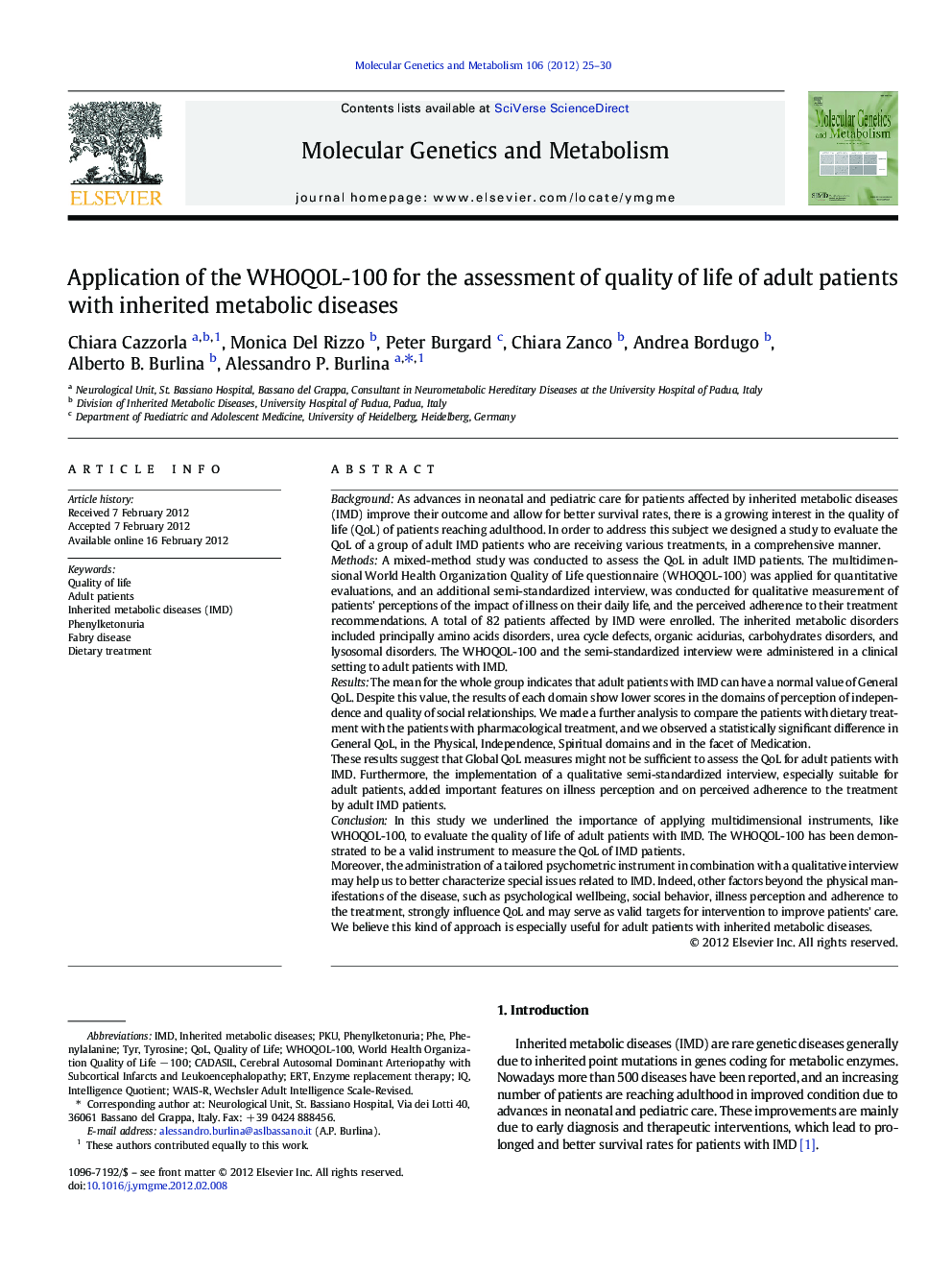| کد مقاله | کد نشریه | سال انتشار | مقاله انگلیسی | نسخه تمام متن |
|---|---|---|---|---|
| 1998515 | 1065812 | 2012 | 6 صفحه PDF | دانلود رایگان |

BackgroundAs advances in neonatal and pediatric care for patients affected by inherited metabolic diseases (IMD) improve their outcome and allow for better survival rates, there is a growing interest in the quality of life (QoL) of patients reaching adulthood. In order to address this subject we designed a study to evaluate the QoL of a group of adult IMD patients who are receiving various treatments, in a comprehensive manner.MethodsA mixed-method study was conducted to assess the QoL in adult IMD patients. The multidimensional World Health Organization Quality of Life questionnaire (WHOQOL-100) was applied for quantitative evaluations, and an additional semi-standardized interview, was conducted for qualitative measurement of patients' perceptions of the impact of illness on their daily life, and the perceived adherence to their treatment recommendations. A total of 82 patients affected by IMD were enrolled. The inherited metabolic disorders included principally amino acids disorders, urea cycle defects, organic acidurias, carbohydrates disorders, and lysosomal disorders. The WHOQOL-100 and the semi-standardized interview were administered in a clinical setting to adult patients with IMD.ResultsThe mean for the whole group indicates that adult patients with IMD can have a normal value of General QoL. Despite this value, the results of each domain show lower scores in the domains of perception of independence and quality of social relationships. We made a further analysis to compare the patients with dietary treatment with the patients with pharmacological treatment, and we observed a statistically significant difference in General QoL, in the Physical, Independence, Spiritual domains and in the facet of Medication.These results suggest that Global QoL measures might not be sufficient to assess the QoL for adult patients with IMD. Furthermore, the implementation of a qualitative semi-standardized interview, especially suitable for adult patients, added important features on illness perception and on perceived adherence to the treatment by adult IMD patients.ConclusionIn this study we underlined the importance of applying multidimensional instruments, like WHOQOL-100, to evaluate the quality of life of adult patients with IMD. The WHOQOL-100 has been demonstrated to be a valid instrument to measure the QoL of IMD patients.Moreover, the administration of a tailored psychometric instrument in combination with a qualitative interview may help us to better characterize special issues related to IMD. Indeed, other factors beyond the physical manifestations of the disease, such as psychological wellbeing, social behavior, illness perception and adherence to the treatment, strongly influence QoL and may serve as valid targets for intervention to improve patients' care. We believe this kind of approach is especially useful for adult patients with inherited metabolic diseases.
► A new psychometric test for the assessment of quality of life of adult patients with inherited metabolic diseases (IMD), including a qualitative questionnaire to better characterize special issues related to IMD.
► Adult patients with IMD have been selected for the study.
► The application of the WHOQOL-100 highlighted that quality of life differences for adult patients with IMD can also depend on the type of treatment.
Journal: Molecular Genetics and Metabolism - Volume 106, Issue 1, May 2012, Pages 25–30